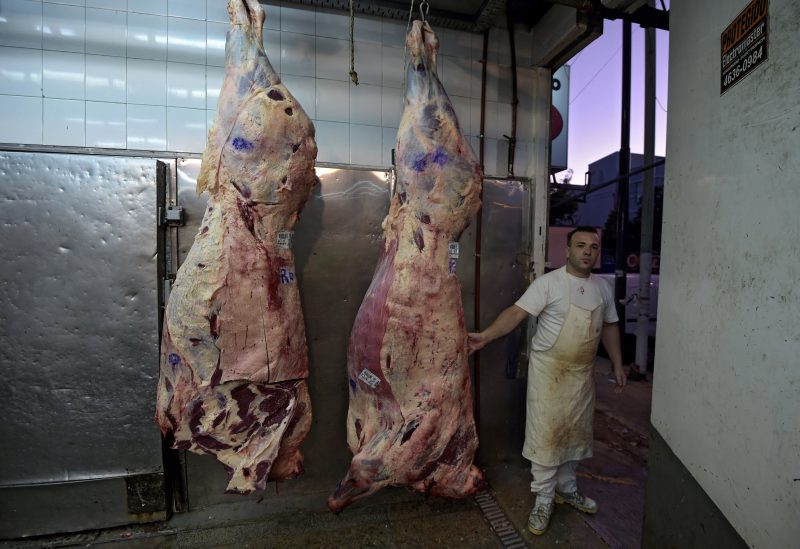Macron defends Mercosur trade deal, as farmers protest
South American beef would become cheaper for EU consumers, but the deal has to be ratified first (JUAN MABROMATA)
Paris (AFP) – French President Emmanuel Macron defended a huge trade deal agreed by the European Union and four South American countries and warned against “neo-protectionism”, as farmers and environmentalists step up their resistance to the accord.
The deal announced Friday by the EU and Argentina, Brazil, Paraguay and Uruguay is the largest ever struck by the European Union.
It covers markets that total approximately 780 million consumers representing a quarter of global GDP.
Speaking in Brussels late Tuesday, Macron defended the agreement, despite a government spokeswoman earlier saying France was not yet rushing to ratify the trade deal.
He warned against what he termed “neo-protectionist” attitudes, which would refuse reciprocity and exchange.
“We are not protectionists,” he said when asked about the issue.
“Those who say that any trade agreement is bad, tell me in such cases how they will dress, eat, move,” he said, adding: “A trade deal is not bad in itself”.
Macron added that measures had been taken on the European side to protect, via quotas, sensitive sectors such as beef and sugar.
EU and Mercosur countries have hailed the deal, which was 20 years in the making, as historic.
European Commission President Jean-Claude Juncker billed it as a rousing endorsement of “rules-based trade” at a time of growing protectionism in the US, which is embroiled in a trade war with China and disputes with the EU.
But the road to ratification by all 28 EU members could be a long one given the growing public hostility to free trade deals, even in traditionally trade-friendly countries.
On Tuesday evening farmers gathered across France to protest against the deal.
French government spokeswoman Sibeth Ndiaye had earlier said France would not be rushing to ratify it before seeing all the details.
Citing the 2017 EU-Canada trade deal, which France has yet to ratify, she told the BFM news channel: “We will do the same thing with the Mercosur countries… We will look at it in detail and depending on the details we will decide.
“France is not yet ready to ratify (the deal),” she said.
The note of caution sounded by France Tuesday “is the first step in a sort of battle of wills over the concrete implementation of the deal”, said the vice-president of the Institut des Ameriques research group in Paris, Carlos Quenan.
– ‘Dark moment’ –
The Bruegel institute, a Brussels-based economic think tank, in an August 2018 paper noted a growing fear of openness to international trade, blamed for increasing inequality.
It cited a poll showing 75 percent of the French and 57 percent of Germans favouring greater protection against foreign competition.
“The question is not whether this deal is interesting in trade terms only. We must ensure that it respects the goals we have set ourselves in terms of sustainable farming practices and fighting climate change,” Sebastien Jean, director of France’s CEPII centre for economic research, told AFP.
The negotiations had repeatedly foundered over the years on opposition from European beef producers, particularly small farmers who fear being undercut on price by imports from Brazil, the world’s biggest beef exporter.
The Copa-Cogeca union, which represents 23 million farmers across the EU, warned the deal “will go down in history as a very dark moment”.
Under the deal, Mercosur countries will be able to export 99,000 tonnes of beef to Europe at 7.5 percent tariffs, among other concessions.
While the quotas are a fraction of the amounts Mercosur was seeking, France’s Confederation Paysanne union warned that grass-fed French beef would face unfair competition “from animals crammed into feedlots and stuffed with GMO soy and antibiotics.”
– The trade lever –
The South Americans, for their part, will progressively eliminate duties on European cars and car parts, among other products, and open up their public sectors to EU companies.
The deal contains a “safeguard mechanism” allowing both parties to temporarily restrict agricultural imports in case of a deluge and also allows European authorities to suspend approval for products they perceive as posing a health risk.
But it has also run afoul of climate activists, who accuse Brazil of sacrificing its rainforests and indigenous peoples to the country’s powerful agrifood sector.
French environmentalist and European parliamentarian Yannick Jadot said it was “shameful” of the European Commission to have signed a pact with climate-sceptic Brazilian leader Jair Bolsonaro.
Defenders of the agreement have argued that it will give the EU more leverage in South America, a continent where it has long played second fiddle to the United States.
France’s government is expected to recommend ratifying the deal in a meeting on Wednesday.
Disclaimer: Validity of the above story is for 7 Days from original date of publishing. Source: AFP.


